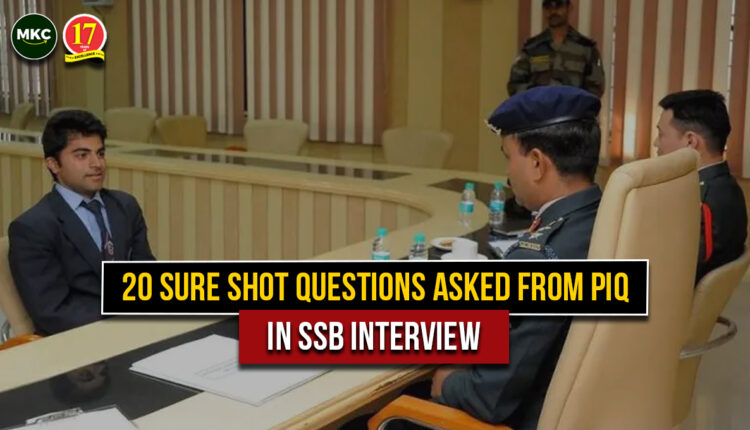20 Sure Shot Questions Asked from PIQ in SSB Interview
PIQ stands for Personal Information Questionnaire. It is a document or a set of basic questions that candidates are required to fill out during their SSB (Services Selection Board) interview. The PIQ contains standardized questions that are essential for evaluators to assess and understand the candidate’s personal background, interests, experiences, and qualities throughout the SSB testing process.
Details Mentioned in PIQ form
Table of Contents
The Personal Information Questionnaire (PIQ) in the SSB interview includes questions pertaining to various aspects of the candidate’s background and experiences. These may include:
- Place of residence
- Demographic details
- Details of family members
- Educational background
- Age, height, and weight
- Participation in activities like NCC, sports, or games, along with any positions held
- Involvement in extracurricular activities, interests, and hobbies
- Details of previous SSB attempts
The PIQ holds significant importance in the SSB interview as it provides evaluators with valuable insights into the candidate’s personality, character, interests, and experiences. It helps assessors understand the candidate’s background, achievements, and areas of interest, aiding them in making informed judgments about the candidate’s suitability for a career in the armed forces.
20 Sure Questions from PIQ form
- Where are you coming from and what stations had come in between?
- Tell me about the city you are coming from?
- Tell me the meaning of your name?
- Who all are in your family, to whom you are closest, and why?
- 5 good points and 5 bad points about your city?
- Why is there a fall in your marks?
- Why didn’t you join NDA if you were so motivated to join the forces?
- Why didn’t you join as a soldier if you were so motivated to join the forces?
- If you have completed your graduation, why aren’t you doing any job?
- Why did you choose BSc/BCA over BTech?
- Do you have any girlfriend/boyfriend?
- How do you spend your pocket money?
- In what sports you have participated and what was your position in them?
- Why do you want to join the army?
- Why didn’t you join the NCC in your graduation?
- How do you spend your free time?
- What responsibilities you have shouldered in your life?
- How will you be useful to this organization?
- Why did you have a drop year?
- In what ways you have helped your family members?
Questions Related from your Previous SSB
During your SSB interview, you might encounter questions related to your previous attempts. Here are some examples:
- Why didn’t you succeed in your first attempt?
- What were the reasons for being conference out (CO) or screen out (SO) in your last attempt?
- What was the batch number of your last SSB?
- Can you share details about your previous SSB attempts?
These questions aim to understand your past experiences, challenges faced, and the lessons learned from your previous attempts. It’s essential to answer them honestly and reflect on how you’ve grown and improved since then.
Extra Important Questions
- How many best friends do you have? Why?
- Which is the quality of your best friend you like the most? Which is one thing that you dislike about your friend?
- Whom do you tell your secrets to? Friends, Parents, or Sister/Brother?
- Who is your role model?
- Tell me about your daily routine.
- Tell me about your routine at the weekend.
- Who is your favorite teacher and why?
- Tell me the most mischievous thing that you have done.
- How did you prepare for SSB?
- What if you got rejected this time?
- What are you afraid of?
- Tell me the most embarrassing situation.
- What are your future plans?
- Where do you think you lacked in previous SSB attempts?
- Rate your performance in all the tasks (GTO & Psych).
Tips to Tackle these Questions
Absolutely, most of the information required to answer these questions can be prepared in advance. However, it’s crucial to maintain authenticity while responding during the SSB interview. Here are some key points to keep in mind:
- Be confident in your responses and ensure that you convey your thoughts clearly.
- Stick to what has been asked and avoid providing unnecessary additional information.
- Keep your replies concise to avoid confusion and maintain clarity.
- It can be helpful to create a mental map of the questions asked and organize your responses accordingly.
By following these guidelines, you can effectively navigate through questions about your previous attempts during the SSB interview.








